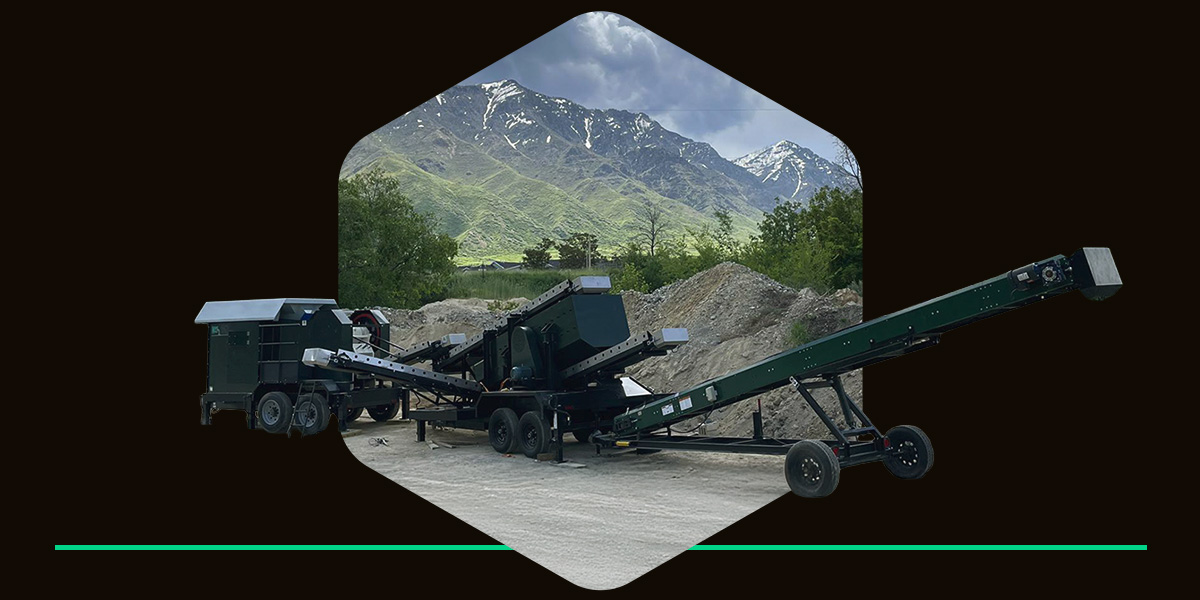
Are you looking to enhance your mining, quarrying, demolition or construction company’s efficiency and profitability? Handling material crushing on-site is an excellent way to do so. Learn more about crushing equipment and when to use rock, concrete and asphalt crushers.
Overview of Crushing Equipment
Crushing equipment breaks materials like rock and concrete into smaller gravel-sized or sand-like pieces. These heavy-duty machines are frequently used in construction, mining, demolition and recycling projects. There are two categories of crushers:
- Primary crushers: Used first to break down heavy-duty materials like larger chunks of asphalt.
- Secondary crushers: Used second to further break down materials that have already been crushed into usable sizes.
Crushers can be portable or stationary. If you’re looking to expand your current business’s offerings, you can enjoy top-notch flexibility and mobility with a portable unit. Crushing on-site can offer tremendous savings reducing or eliminating substantial transportation, demo disposal costs, and aggegate purchase costs by recycling on-site. Stationary models are best-suited for long-term projects and businesses focused solely on crushing and screening.
Types of Crushers
When choosing crushers, consider the hardness and abrasiveness of the material, the size of the material, the desired size of the finished product, and how much material you need to process per hour. For example, is the material hard like granite? Do you want to create sand-like particles or something bigger? Here are some examples of crushers and how they work to help you make the right choice:
- Jaw crushers: Jaw crushers crush materials between two metal plates. They can handle large chunks of material and require less downtime than other types. Because they can handle bigger materials, jaw crushers are typically used as primary crushers. They are the most versatile of all crushers. They produce the more angular material preferred by many engineers for it’s holding power on itself.
- Cone crushers: A gyrating cone breaks down materials. Typically, cone crushers are used as secondary crushers, meaning they break down materials that have already been processed by primary crushers. The crushed materials are consistent in size, and this type of crusher can break down a large quantity of materials in a short time. They are primarily used for crushing harder material into small sizes.
- Impact crushers: Rather than relying on pressure to break materials, impact crushers use the force of repeated blows to shatter rocks and other materials. They can be used as primary or secondary crushers. Their main application is for softer material and especially gummy asphalt that can be an issue for other types of crushers. They also produce a more rounded material and can be more suitable for decorative gravel for instance.
So, while they can work independently, crushers are often paired with other crushers and screeners to break down and then separate materials.
Industries That Rely on Crushers
The following industries can use crushing equipment:
- Quarrying: Professionals harvest raw materials from the ground and pass them through a crusher to retrieve valuable ores or construction materials.
- Aggregate processing: Crushers can help process basalt, limestone, granite, river pebbles and more.
- Construction and demolition: Crushers help manage waste, reducing transportation costs and environmental impact.
- Mineral processing: Breaking down ore prepares it for further processing.
- Recycling: Materials like concrete and asphalt can be broken down and then recycled or reused.
Adding crushing equipment to your inventory can help you avoid having to hire another company to dispose of or process materials.
Rock vs. Concrete vs. Asphalt Crushers
Simply put, different crushers can handle different materials. Read more about how rock, concrete and asphalt crushers are used.
1. Rock Crushers
Rock crushers can break down sandstone, limestone, granite and basalt. They are designed with crushing power substantial enough to handle harder material and can provide more durability, longevity, and reliability. You might use jaw crushers or impact crushers, depending on the hardness and abrasiveness of the material:
- Jaw crushers: Used for hard materials like granite and basalt, and material with rebar or wire reinforcement. Jaw crushers offer the lowest operation and maintenance costs.
- Impact crushers: Used for soft to medium-hard materials like limestone. Impact crushers, due to their crushing principle, can require significant operation and maintenance costs with blow bar and wear plate replacement.
Jaw crushers are great for breaking up large materials into more manageable pieces and harder material. The produce a more angular shaped product. Impact crushers produce a more sand-like result when used with limestone and other sedimentary deposit-type rocks, and produce a more rounded material.
2. Concrete Crushers
A concrete crusher breaks concrete into small pieces, making it easy to dispose of or recycle. Concrete can be recycled and reused repeatedly, which is important because cement — the primary component of concrete — releases about 8% of the global total of carbon dioxide per year. Recycling concrete into roads or building foundations reduces landfill waste and reliance on new raw materials. If you cannot reuse your recycled concrete at the current jobsite, you can also sell it to make an additional profit.
You can use jaw crushers, cone crushers and impact crushers for concrete as concrete is comparatively soft material generally:
- Jaw crusher: A jaw crusher can break up large chunks of concrete. It is the preferred method when wire and rebar are in the material to be crushed as this can cause other types of crushers to jam or incur heavy maintenance costs.
- Cone crusher: A cone crusher produces consistently sized crushed pieces, which are ideal for recycling into roads and foundations.
- Impact crusher: An impact crusher breaks up concrete without requiring excessive pressure, which minimizes dust.
3. Asphalt Crushers
Similar to concrete crushing, asphalt crushing helps make construction more eco-friendly. Reclaimed Asphalt Pavement (RAP) can be used to:
- Build new highways.
- Fill potholes.
- Build walkways and bike paths.
- Lay a new driveway.
- Build a foundation for a playground.
- Repair wear and tear on driveways.
The asphalt recycling process involves using a jaw crusher or an impact crusher to break down asphalt and mixing the asphalt pieces with other materials, such as virgin asphalt, to create RAP. Jaw crushers are typically the go-to choice for primary crushing, while impact crushers grind the pieces down into a finer aggregate.
If asphalt is contaminated or otherwise unable to be recycled, you can still use a crusher to prepare it for disposal. Grinding it up for disposal can reduce transportation costs and landfill tipping fees, which you must pay upon dropping materials at a landfill.
Comparing Rock, Concrete and Asphalt Crushers
Here’s a quick breakdown of the different crushers to help you make the best choice for your business:
| Crusher Type | How It Works | Applicable Industries |
|---|---|---|
| Rock Crusher | Breaks down softer rocks like limestone and especially harder materials like granite. | Quarrying, aggregate processing and mineral processing. |
| Concrete Crusher | Crushes concrete for disposal or recycling. | Construction, demolition and recycling. |
| Asphalt Crusher | Breaks down asphalt for disposal or creation of RAP. | Construction, demolition and recycling. |
Choosing a Portable vs. Stationary Crushing Machine
While stationary crushing equipment often works for long-term projects or operations dedicated to crushing and screening, portable crushers offer unparalleled flexibility, cost-effectiveness and efficiency. With a portable unit, you can handle all crushing on-site yourself, rather than paying to dispose of materials. Enjoy unprecedented portability and profitability with a portable crushing machine.
Find Portable Crushing Equipment From Senya Crushers
Senya Crushers is leading the way in the MICRO crushing category. If you’re looking to revolutionize your small or midsized business’s bottom line with crushing equipment, you can rely on us. Our product line includes portable crushing machinery and portable rock crusher plants made right here in the United States.
Whether you’re looking for jaw, cone or impact MICRO crushers, you’ll find durable options that get the job done at Senya Crushers. Fill out our online form to get a free quote and learn more about our portable rock crushing equipment!








